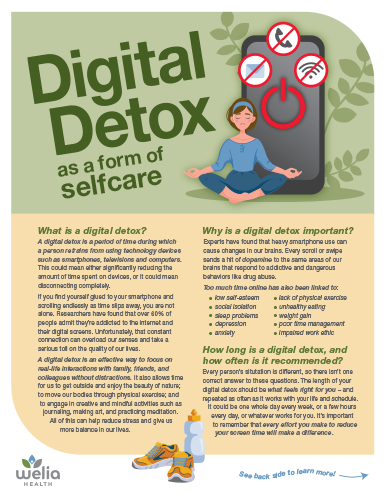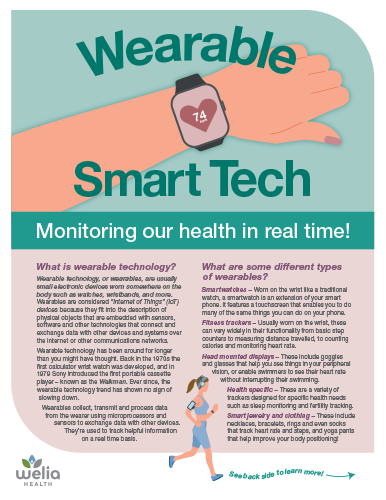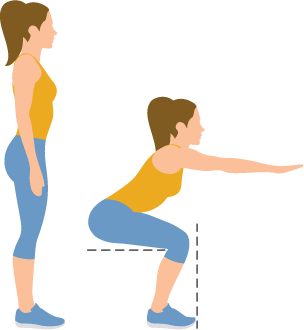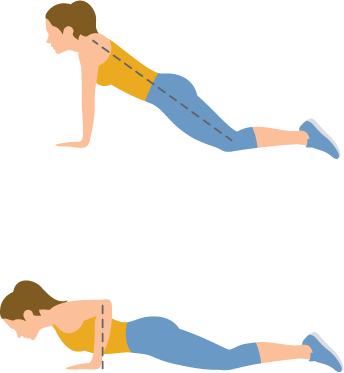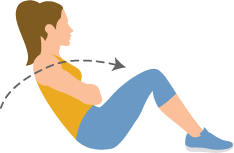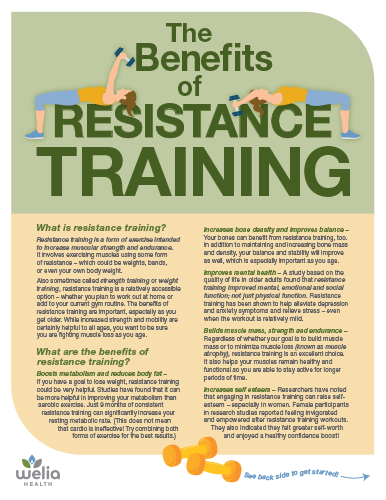What is a digital detox?
A digital detox is a period of time during which a person refrains from using technology devices such as smartphones, televisions and computers. This could mean either significantly reducing the amount of time spent on devices, or it could mean disconnecting completely.
If you find yourself glued to your smartphone and scrolling endlessly as time slips away, you are not alone. Researchers have found that over 60% of people admit they’re addicted to the internet and their digital screens. Unfortunately, that constant connection can overload our senses and take a serious toll on the quality of our lives.
A digital detox is an effective way to focus on real-life interactions with family, friends, and colleagues without distractions. It also allows time for us to get outside and enjoy the beauty of nature; to move our bodies through physical exercise; and to engage in creative and mindful activities such as journaling, making art, and practicing meditation. All of this can help reduce stress and give us more balance in our lives.
Why is a digital detox important?
Experts have found that heavy smartphone use can cause changes in our brains. Every scroll or swipe sends a hit of dopamine to the same areas of our brains that respond to addictive and dangerous behaviors like drug abuse.
Too much time online has also been linked to:
- low self-esteem
- social isolation
- sleep problems
- depression
- anxiety
- lack of physical exercise
- unhealthy eating
- weight gain
- poor time management
- impaired work ethic
How long is a digital detox, and how often is it recommended?
Every person’s situation is different, so there isn’t one correct answer to these questions. The length of your digital detox should be what feels right for you – and repeated as often as it works with your life and schedule. It could be one whole day every week, or a few hours every day, or whatever works for you. It’s important to remember that every effort you make to reduce your screen time will make a difference.
A digital detox benefits our physical AND mental health
Give your body a break!
Being glued to your smartphone or computer for hours can lead to eye strain, blurry vision, headaches, and back and neck problems. Disconnecting provides a welcome relief to these tired or aching areas of your body.
Also, according to a study of 1,000 college students, those who used their smartphones for 5 or more hours per day had a 43% increased risk of obesity; and were twice as likely to drink sugary beverages and eat unhealthy snacks than other students in the study.
Sleep better!
When your body knows it’s time for sleep, your brain releases the chemical melatonin to help you relax and drift off. Staring at a screen before bedtime keeps your brain alert and delays that melatonin release.
Bringing your smartphone into your bedroom and using it before sleeping can also disrupt your sleep-wake cycle due to the blue light from the phone’s screen.
Not only are you groggy and less productive the next day, but a lack of sleep over time can weaken your immune system, increase your risk of disease, and negatively impact your mood and mental health.
Relax and feel content!
Studies have shown that taking a scheduled break from your digital devices can lower your stress levels and help you focus on the positive things happening around you.
Feel better about yourself!
Not only does surfing the net rob you of time, it can often trigger feelings of FOMO – fear of missing out.
Scrolling through others’ curated images of their lives can make us feel depressed and inadequate. Research indicates that for high-frequency users of Facebook, Instagram and other platforms, as their social media usage increases – their life satisfaction and self-esteem decreases.
Taking a digital detox not only helps reduce the risk of loneliness and depression creeping in, it also frees up valuable time for us to rest, unwind, and incorporate self-care into our lives.
Digital Detox Tips
- Be realistic with limits – If taking a complete break from technology feels too extreme, try thinking in terms of small steps to create boundaries between you and your devices in order to benefit your emotional and physical health.
- Start small – Start on the first day by not looking at your phone for 15 minutes. The next day, unplug for 30 minutes. Work up to a half day (or even a full day) every week when you stay away from digital media and social platforms. Or specify 3 periods on those days when phone use is permitted; while keeping the rest of the day tech-free.
- Turn off notifications – Turning off notifications for emails, social media and texts eliminates constant interruptions, and enables you to respond when it works best for you.
- Delete apps – Think about whether there are apps on your phone that don’t contribute to your happiness. If yes, consider deleting them. You probably won’t even miss them, but you can always add them back if you do.
- Leave your phone behind – If you can, have your phone in a different room (or a backpack or bag) instead of your pocket. This eliminates the natural tendency to pick it up and check it. Or try going for short walks while leaving your phone at home.
- Wake up to an alarm clock – Using an old-fashioned alarm clock rather than your phone will help you with your digital detox. Even better, try not to check your phone at all for the irst half hour you are awake. Instead, you can use this time for self-care practices like stretching or meditating.
- Hold yourself accountable – If you have friends or colleagues that you communicate with only via DMs or email, give them a heads-up that you will not be using your phone during certain hours. Invite others to digitally detox along with you. You can enjoy being tech-free together – while holding each other accountable!
Let’s Unplug!
3 important things to remember:
- A digital detox is a form of self-care
- It has both mental and physical benefits
- Start small and make adjustments as you go


